Hannah Rasmussen's Blog, page 2
June 9, 2016
The church in Africa deserves to be heard
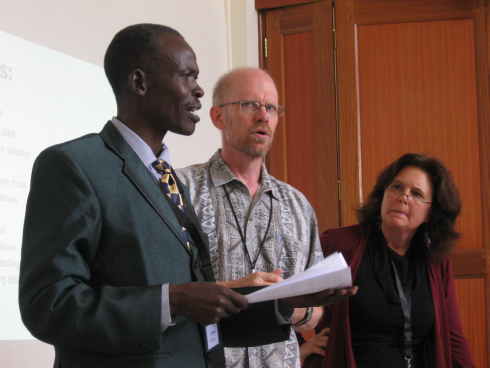
Africa Study Bible contributor Bishop Raphael Okeyo from Tanzania
I believe that the voice of the church in Africa deserves to be heard.
We don’t need imported sermon illustrations about “Prayer is not like a vending machine” – what’s a vending machine anyway?
We need stories from African pastors and teachers that give us a new perspective on familiar Bible passages. We need the story about trapping monkeys in the Kalahari desert. Monkeys know where water is found, but they want to keep the secret to themselves. So people catch a monkey and feed it salt until it becomes thirsty. Then they follow it to the water source. When we hear that Christians are called “the salt of the earth,” it can also mean that we lead people to the source of living water (Matthew 5:13).
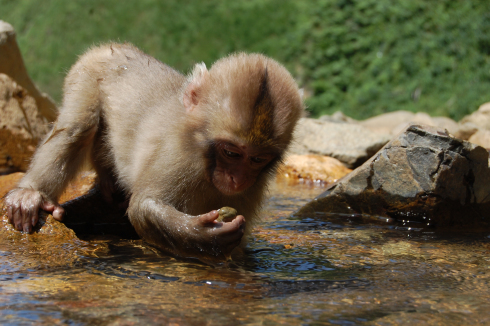
Photo by Craig Shaw from ForestRescue
Pastors and teachers from 50 countries have written 2200 notes like the one I mentioned as part of the Africa Study Bible. On the page next to the Bible text, notes and essays connect Scripture to African contexts to help people live out their faith without rejecting their whole culture.
This is not your typical study Bible, written by about 50 American scholars. 345 people wrote notes, edited pieces and reviewed the theology and relevance of each piece.
These writers were dedicated. Some authors were dealing with civil war, persecution as Christians, malaria, or family funerals. All of them wrote alongside their normal work in churches, theological schools or businesses. Nearly all wrote in their second language – either English, French, Portuguese, Arabic or Swahili.
But as I managed the first half of the editorial process, I saw their commitment firsthand. They believed this was crucial work for God’s kingdom. As contributor Dr. Issiakia Coulibaly from West Africa Alliance Theological Seminary (FATEAC) said, “Like Philip explaining the Scriptures to the Ethiopian eunuch (Acts 8:31), so will the Africa Study Bible be to thousands and thousands of African Christians today.”
The writing is done, and the editing is nearly complete. The church in Africa is ready to speak – we just need to give them a platform.
If you want the voice of the church in Africa to be heard, this week is your chance! Invest here through Kickstarter. Your giving enables the writers to give everyone their “rich resource for the church in Africa and the world” (in the words of contributor Bishop Dr. Isaiah Majok Dau from South Sudan).
Then be salt and lead people to the water. The Africa Study Bible is published by Oasis International Ltd to satisfy Africa’s thirst for God’s Word. Would you join me in spreading the word about the Bible for the last 7 days of our fundraising campaign? Share this overview video on social media, email or in-person.
[image error]
[image error]
Instead of me telling you any more about the Africa Study Bible, listen to a Kenyan World Christianity scholar. Dr. Wanjiru Maggie Gitau shares how the Africa Study Bible reflects the exciting things God is doing in Africa today. Or, check out this sneak peek of the book of Genesis, where the authors’ notes speak for themselves!
Let’s hear what the church in Africa has to say to us.


April 10, 2016
Stained Glass (spoken word video)
To all us glass objects… what if our brokenness makes the light beautiful? An inspirational poem about grace. (Click here to watch video)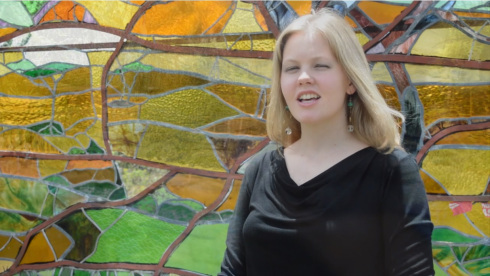


March 8, 2016
Sunburn: A Memoir Intro
The first page of God Bless the Children of Tanzania, a memoir I am considering writing:
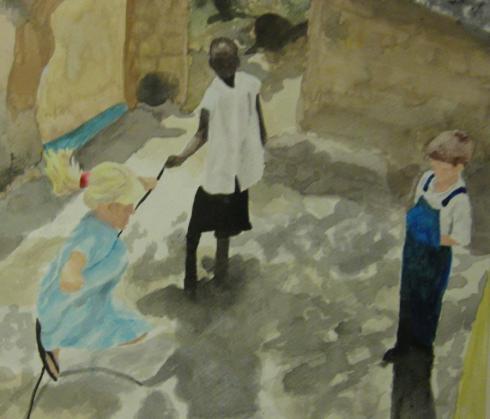 When people ask “What was it like to grow up in Africa?”, I want to tell them about the sun.
When people ask “What was it like to grow up in Africa?”, I want to tell them about the sun.
They are usually our family and friends from Minnesota, so they will think I am talking about the weather. I never understood how the weather could provide conversation material until I went to college in Minnesota. In Mwanza, Tanzania, the sun was an assumption. You depended on it waking you up just before the BBC news on the radio at breakfast. Its predictable leave was accompanied by the buzz of a mosquito and the scent of Queen of the Night.
Sometimes, provoked by the sun’s long harsh reign, the sky would throw a party with a strobe light and a thumping beat on the tin roof. My sister and I would run outside to join the downpour dance. Or when I was little, my siblings and I would jump up and down on our beds and build blanket forts for our stuffed animals, snuggling and giggling. In comparison to the power of thunder-lightning, the drizzle in America feels like someone spitting in my face. So if I say “rainy day” they will think I mean something sad.
But here I am being dragged into a discussion of the weather. I want to describe the sun. I want to describe opening my eyes on Saturday under a mosquito net shot through with sunlit dust. Only then, they will think my childhood was magical. It is tempting to be lulled into nostalgia.
If that were the whole truth, I would not be coming to talk to you.
I pour myself a cup of chai – by which I mean regular tea with milk, not the lattes with Pumpkin Pie Spice – and stir in a spoon of (cane) sugar. I settle into one of the wicker chairs with my back to the reception desk. The books on the display shelf are to do with Christian marriages, raising cross-cultural kids, and grieving. Outside the windows is a vibrant garden, bursting with the life of this Green City under the Sun, Nairobi, Kenya.
Yes, the sun was bright. But there was also darkness in the daytime that I am afraid to look at alone. I am waiting for you to examine my sunburn.


November 18, 2015
Haggling with God
Shortly after my graduation from college, I posted a poem quoting Jacob’s prayer at Bethel: “If God will be with me and will watch over me on this journey I am taking and will give me food to eat and clothes to wear so that I return safely to my father’s house, then the LORD will be my God and this stone that I have set up as a pillar will be God’s house and of all that you give me I will give you a tenth” (Gen. 28:20-22).

Jacob made his vow after dreaming of a stairway to heaven – Untitled by Michael Keany (Own work). [CCo] via Flickr
Like Jacob, I was on the move and concerned about life’s basic necessities. I had debated between opportunities with Christians for Biblical Equality, InterVarsity and my multicultural church. But I didn’t feel at peace walking down any of these paths. God called me – over Skype in the person of my dad’s dinner guest – to join the team working on the Africa Study Bible. Since my parents live on the same campus as some of the Africa Study Bible reviewers, a few months later I found myself returning “safely to my father’s house.”But like Jacob, my life after this bargain with God was a struggle. When I arrived in Nairobi, I started from scratch. I developed systems to organize and track 2000 pieces by 250 writers through the editorial process. With my high school friends gone and most of my work being over email and Skype, I had to start over with friendships as well.
I felt helpless – like I was unraveling. But when I stepped back, I realized God was weaving threads back into my life in a providential pattern. In addition to my sociology and English majors, old skills of French and technology came in handy. Christians for Biblical Equality contracted me to write a Bible study guide for groups of young adults. In Minnesota I had planned to help out with a church plant or youth group. Instead, two months after I moved back to Nairobi, my family’s church invited us to help with a church plant nearby. I was asked to co-lead the teens class.
Like Jacob, I gave God a tenth of what he gave me. It only multiplied my blessings. Living with my parents enabled me to save money. I was able to pay off all my student loans within a year of graduation. My contract writing paid for a Kilimanjaro summit to celebrate twenty years since I first landed in Tanzania. God went above and beyond providing food and shelter.
Instead of helping out with InterVarsity, this weekend in Nigeria I met with leaders of their sister movements in the International Fellowship of Evangelical Students. We were defining a partnership to create a Bible study guide compatible with the Africa Study Bible. I marveled, “How in the world did I end up in this room with international leaders working on a project that could impact the continent?”
Jacob thought he was driving a hard bargain by nailing down the specifics of God’s provision. But he hadn’t listened closely to God’s unconditional promise the night before: “I am the LORD, the God of your father Abraham and the God of Isaac. I will give you and your descendants the land on which you are lying… All the peoples on earth will be blessed through you and your offspring. I am with you and will watch over you wherever you go and will bring you back to this land…” (Gen. 28:13-15).
When God told Jacob he would bless him and make him a blessing to many nations, Jacob haggled for clothes and food instead. But God didn’t agree to settle for Jacob’s meager terms. Jacob had no idea of the scope of what God was going to do for him and through him. I’m beginning to realize that I have no idea either.


August 15, 2015
Matilda: The Truest Fiction (Spoken Word + Video)
 Watch the video on YouTube or read the poem below.
Watch the video on YouTube or read the poem below.
*trigger warning: child abuse*
What if I told you
That Roald Dahl didn’t write Matilda –
Matilda did.
She could read nearly as soon as she could talk,
So no one was surprised when she grew up to become an author.
Believe with me for a moment that
she tried several times to write an autobiography
but it was too painful to share.
So instead she created Roald Dahl,
wrote his autobiographies “Boy” and “Going Solo”
which of course were realistic fiction.
Next she tried to reach out to her younger self,
With stories of villains vanquished by children.
Stories with lots of funny bits, like children’s books ought to have.
But when a boy came over for tea
from what she would later call Crunchem Hall Primary School,
She realized children needed to hear her story.
She decided to write fictionalized reality.
The headteacher who tested students on their times tables
And insisted on perfect cleanliness
would be called Miss Trunchbull.
Yes, people would be caricatures with labels for names
like Miss Honey the teacher and Mr. Wormwood the car salesman crook.
The kid readers would never wonder who was bad or good
Because Miss Trunchbull would never put on charity fairs or give scholarships
and the parents would be nasty and dumb.
The horror of the headteacher’s office
Would not be rumors of what he did to little boys there
It would be something concrete,
a cement cupboard lined with objects that pricked you.
And since teachers couldn’t stop the menace,
Matilda’s burning anger would become a magic power
She would save the kids and send Miss Trunchbull away for good.
Of course, in real life there was no magic.
Just because Matilda could read books on the top shelf
Didn’t mean she could reach them.
Even as the cleverest student in the class
Her brainpower produced no miracles or even cunning plots
Only test scores that made Crunchem Hall look good
And a tendency to distrust her feelings.
And no matter how her eyes burned with anger
She couldn’t lift a finger,
much less levitate a piece of chalk to write threats from a ghost.
But write…
maybe she could write
words powerful enough to right wrongs.
Miss Trunchbull got away with outrageous evil
Precisely because parents found it unbelievable
Truth is stranger than fiction, Matilda learned,
So call it a story if you want people to listen
Peddle lighthearted darkness.
Yes, she could write a comedy
where everything was obvious
and the vulnerable were protected by mysterious forces beyond their control
she could write it for the children
perhaps not an autobiography, strictly speaking,
but it’s what she would have wanted to hear.
She hoped
that some precocious child who escaped to the library
would find her book on the shelf
would laugh at Matilda’s pranks
would know that justice wins in the end.
What if Matilda could save some kids yet?
Invite them to believe something so strange it might be true
That life is a comedy
That children’s books always have a happy ending.
… or in that case, what if Matilda wouldn’t have to save them?
Characters are not responsible for meting out poetic justice.
The author of the children’s stories would give them happy endings.
Mysterious forces protect the vulnerable
And I hear God’s in the business of saving.
What if I told you
the story isn’t over yet
but I know it will end well.
Believe with me for a moment.
What if I told you
The truest fiction I know how
Would you believe me?


August 6, 2015
Shalom 02: The Homecoming
Peace is “salama” in Swahili, much like the Hebrew shalom. The Homecoming is a poem about finding wholeness (view pdf).

Photo credit Steve Rasmussen


July 23, 2015
Shalom and Integrity
I want to be an integrated and whole person.
By W. Carter (Own work). [CCo] via Wikimedia Commons
My life can feel fragmented: Tanzania, Kenya, the USA. Christian and secular environments. Extended family, family friends, peers. I could be a different person to everyone and probably get away with it. Online, everyone now has access to impression management simply by choosing who can see each facebook post. But I’ve found over and over that it’s a small world. I’ve seen hypocrisy hollow out foundations as effectively as termites. If I cut myself up into compartments I might not know who I am.Like a building with structural integrity, an integrated person has a grounded sense of self to build a life on. If you have integrity, people trust you because you have consistently good character. To be the same person to all people, you need to integrate the various parts of your life. Shalom is Hebrew for wholeness and deep peace. I feel like becoming whole involves making peace from the pieces: the positive and the negative experiences, conflicting worldviews and different cultural environments.
But it’s impossible – and unwise – to be exactly the same to everyone. In some situations you should wear jeans, in others you should eat with your hands. The challenge is adapt to others’ expectations while retaining your essence. For instance, successful communication results in people understanding each other. So I adjust my vocabulary and accent to match the person I’m talking to. I avoid proper nouns that are unknown to my listener so that I don’t alienate them by exotic name dropping. But being a good chameleon can make it hard for people to see you. If people don’t read me in context, if I censor myself and translate my existence – will people understand who I am?
By Dan Pelleg (Own work) [CC0], via Wikimedia Commons
Another meaning of shalom offers a potential solution. It is used as a Hebrew greeting and farewell. Amidst transition between so many worlds, saying hello and goodbye is a way of recognizing and welcoming each other. Just like one greeting prompts another, hospitality fosters more shalom. I invite people into one of my homes, introduce them to loved ones, let my guests taste my food and hear my music. When I feel welcomed, I add a Christian perspective to a sociology assignment and then bring the finished product to a family reunion. And in this small world, sometimes an old acquaintance speaks my mother tongue with all the proper nouns. Or a best friend and I stretch a string across the ocean and listen as good and bad rattles in our tin cans. Affirming the many parts of my life makes me feel whole.When I make connections, I feel alive. I am a third culture kid, born into the in-between of a globalized world. It can be hard to hold two things together, especially in a polarized society. As my pastor once said, bridges get walked on. Social network theorists say that middlemen who connect two otherwise unrelated groups can benefit from bridging structural holes. I hope that integrating myself and my worlds brings peace to myself and others.
I’ve talked about integrating good and bad to make something beautiful in recent posts. Next, I’ll write about temptation’s threat to integrity and perhaps ways that my prayer for shalom has been answered so far. I’d like to hear from you too.
What are your perspectives on shalom and/or integrity?



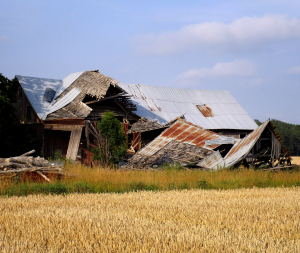
![By Dan Pelleg (Own work) [CC0], via Wikimedia Commons](https://i.gr-assets.com/images/S/compressed.photo.goodreads.com/hostedimages/1475149905i/20687961.png)


